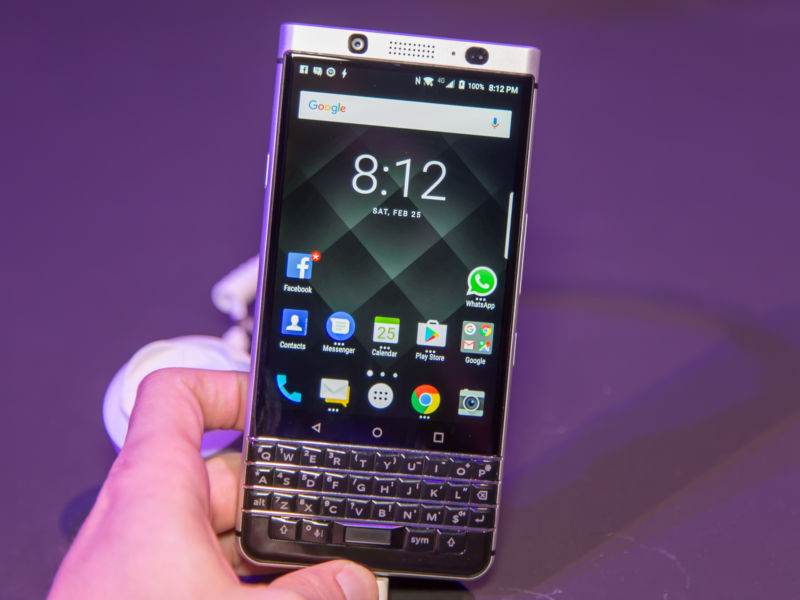
BlackBerry, the once-great smartphone maker that exited the hardware business in 2016, is suing Facebook for patent infringement. BlackBerry owns a portfolio of broad software patents that cover some of the most basic features of modern smartphone messaging services—and the company says it wants Facebook to pay up.
Facebook “created mobile messaging applications that coopt BlackBerry’s innovations, using a number of the innovative security, user interface, and functionality-enhancing features that made BlackBerry’s products such a critical and commercial success in the first place,” BlackBerry’s Tuesday lawsuit claims. The lawsuit argues that Facebook subsidiaries Instagram and Whatsapp infringe BlackBerry’s patents in addition to Facebook’s own messaging apps.
It’s not unusual for technology companies that lose their lead in the marketplace to turn to patent licensing as an alternative way to make money. Yahoo sued Facebook for patent infringement in 2012, for example, while Nokia sued Apple for patent infringement in 2016.
BlackBerry began its own campaign of patent litigation in 2016, suing the little-known Android phone maker BLU and the Internet telephony company Avaya. BLU agreed to pay up last year, and BlackBerry is now moving on to Facebook—potentially a much more lucrative target.
BlackBerry is asserting seven software patents against Facebook, and they’re remarkably broad:
- Patent 7,372,961 covers the concept of generating a cryptographic key by choosing a pseudorandom number and then checking if it is “less than order q prior to reducing mod q.” If it is, the key is used. If not, another key is chosen at random and the process repeats.
- Patent 8,209,634 covers the concept of using icons with numeric badges to signal the arrival of new messages.
- Patent 8,279,173 covers the concept of tagging people in photos using an auto-completing search box.
- Patent 8,301,713 covers the concept of marking a significant lull in a text message conversation by inserting a timestamp reflecting the time of the next message.
- Patent 8,429,236 covers the concept of changing how a mobile device sends messages depending on whether they’re being actively read by the recipient’s device. For example, if updates aren’t being read in real time, then the sending device may be able to conserve power by sending messages in batches rather than one at a time.
- Patent 8,677,250 covers the concept of tying a messaging service and a game application together so that a user playing a game can send messages to contacts on the messaging app that includes updates on the player’s progress in the game.
- Patent 9,349,120 covers the concept of muting a message thread.
In short, BlackBerry claims to own some of the most common features of modern mobile messaging apps, whether they’re made by Facebook, Apple, Google, or anyone else. BlackBerry has asked the court to enjoin Facebook from infringing these patents, which could require Facebook to dramatically overhaul these apps or even shut them down altogether.
But it’s unlikely things will get that far. In recent years, the courts have been relatively reluctant to grant injunctions in cases like this, preferring instead to award cash damages that typically wind up being less lucrative to the plaintiff. Facebook may also attempt to get some of these patents thrown out as invalid—the courts have shown skepticism about the legality of some software patents in recent years.
We can also expect Facebook to look for patents it can use to countersue BlackBerry, which has a smaller business than it did a few years ago but still sells a significant amount of software and services that could be infringing Facebook patents.
And ultimately, there’s a good chance that Facebook will sign a patent licensing agreement with BlackBerry—that’s how Facebook’s dispute with Yahoo turned out, after all.
Update: A BlackBerry spokesperson sent us a comment by email:
As a cybersecurity and embedded software leader, BlackBerry’s view is that Facebook, Instagram, and WhatsApp could make great partners in our drive toward a securely connected future, and we continue to hold this door open to them. However, we have a strong claim that Facebook has infringed on our intellectual property, and after several years of dialogue, we also have an obligation to our shareholders to pursue appropriate legal remedies.
But Facebook signaled that it isn’t in a mood to compromise.
“Blackberry’s suit sadly reflects the current state of its messaging business,” Facebook deputy general counsel Paul Grewal said in an email statement. “Having abandoned its efforts to innovate, Blackberry is now looking to tax the innovation of others. We intend to fight.”

